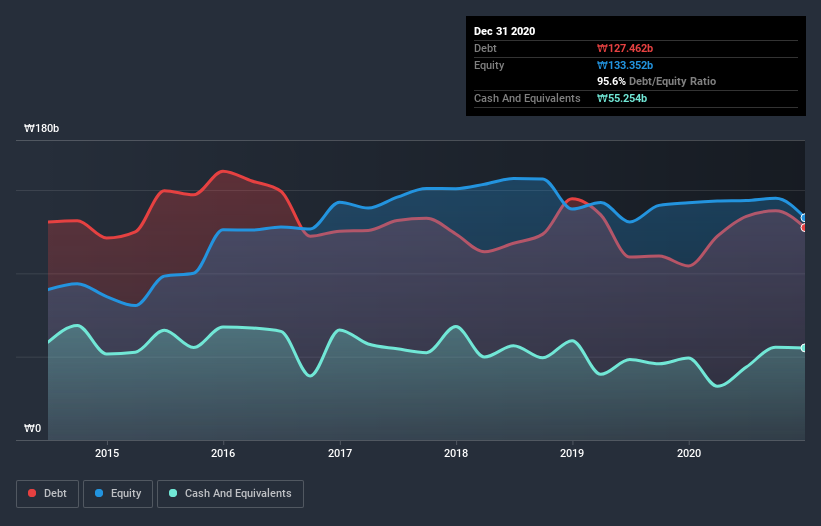- South Korea
- /
- Electronic Equipment and Components
- /
- KOSDAQ:A045970
We Think CoAsia (KOSDAQ:045970) Has A Fair Chunk Of Debt
David Iben put it well when he said, 'Volatility is not a risk we care about. What we care about is avoiding the permanent loss of capital.' So it might be obvious that you need to consider debt, when you think about how risky any given stock is, because too much debt can sink a company. As with many other companies CoAsia Corporation (KOSDAQ:045970) makes use of debt. But the more important question is: how much risk is that debt creating?
Why Does Debt Bring Risk?
Debt is a tool to help businesses grow, but if a business is incapable of paying off its lenders, then it exists at their mercy. Ultimately, if the company can't fulfill its legal obligations to repay debt, shareholders could walk away with nothing. While that is not too common, we often do see indebted companies permanently diluting shareholders because lenders force them to raise capital at a distressed price. Of course, plenty of companies use debt to fund growth, without any negative consequences. When we examine debt levels, we first consider both cash and debt levels, together.
See our latest analysis for CoAsia
What Is CoAsia's Net Debt?
You can click the graphic below for the historical numbers, but it shows that as of December 2020 CoAsia had ₩127.5b of debt, an increase on ₩104.5b, over one year. However, because it has a cash reserve of ₩55.3b, its net debt is less, at about ₩72.2b.

How Strong Is CoAsia's Balance Sheet?
We can see from the most recent balance sheet that CoAsia had liabilities of ₩143.8b falling due within a year, and liabilities of ₩40.6b due beyond that. On the other hand, it had cash of ₩55.3b and ₩42.9b worth of receivables due within a year. So its liabilities total ₩86.2b more than the combination of its cash and short-term receivables.
This deficit isn't so bad because CoAsia is worth ₩266.6b, and thus could probably raise enough capital to shore up its balance sheet, if the need arose. But we definitely want to keep our eyes open to indications that its debt is bringing too much risk. When analysing debt levels, the balance sheet is the obvious place to start. But you can't view debt in total isolation; since CoAsia will need earnings to service that debt. So when considering debt, it's definitely worth looking at the earnings trend. Click here for an interactive snapshot.
In the last year CoAsia wasn't profitable at an EBIT level, but managed to grow its revenue by 14%, to ₩498b. That rate of growth is a bit slow for our taste, but it takes all types to make a world.
Caveat Emptor
Importantly, CoAsia had an earnings before interest and tax (EBIT) loss over the last year. Indeed, it lost ₩4.5b at the EBIT level. Considering that alongside the liabilities mentioned above does not give us much confidence that company should be using so much debt. Quite frankly we think the balance sheet is far from match-fit, although it could be improved with time. Another cause for caution is that is bled ₩24b in negative free cash flow over the last twelve months. So in short it's a really risky stock. When analysing debt levels, the balance sheet is the obvious place to start. However, not all investment risk resides within the balance sheet - far from it. For example - CoAsia has 2 warning signs we think you should be aware of.
At the end of the day, it's often better to focus on companies that are free from net debt. You can access our special list of such companies (all with a track record of profit growth). It's free.
When trading CoAsia or any other investment, use the platform considered by many to be the Professional's Gateway to the Worlds Market, Interactive Brokers. You get the lowest-cost* trading on stocks, options, futures, forex, bonds and funds worldwide from a single integrated account. Promoted
New: AI Stock Screener & Alerts
Our new AI Stock Screener scans the market every day to uncover opportunities.
• Dividend Powerhouses (3%+ Yield)
• Undervalued Small Caps with Insider Buying
• High growth Tech and AI Companies
Or build your own from over 50 metrics.
This article by Simply Wall St is general in nature. It does not constitute a recommendation to buy or sell any stock, and does not take account of your objectives, or your financial situation. We aim to bring you long-term focused analysis driven by fundamental data. Note that our analysis may not factor in the latest price-sensitive company announcements or qualitative material. Simply Wall St has no position in any stocks mentioned.
*Interactive Brokers Rated Lowest Cost Broker by StockBrokers.com Annual Online Review 2020
Have feedback on this article? Concerned about the content? Get in touch with us directly. Alternatively, email editorial-team (at) simplywallst.com.
About KOSDAQ:A045970
CoAsia
An investment holding company, provides system solutions in South Korea and internationally.
Flawless balance sheet with low risk.
Similar Companies
Market Insights
Community Narratives



